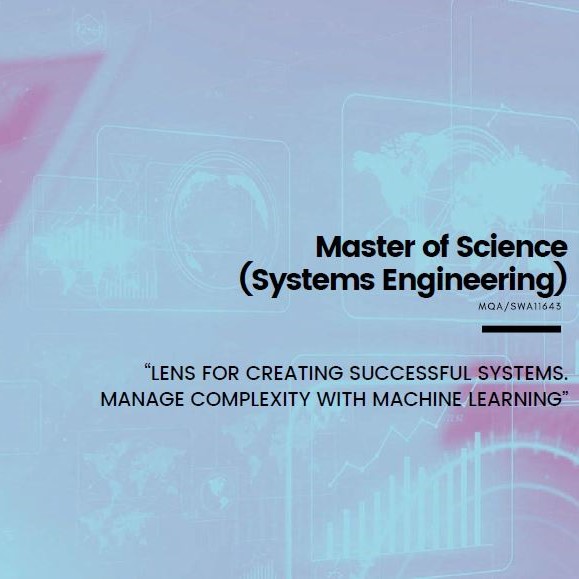MASTER OF SCIENCE (SYSTEMS ENGINEERING)
Introduction
Master of Science (Systems Engineering) program is designed to combine rigorous and in-depth fundamentals of system engineering in which emphasizes an interdisciplinary approach between engineering, technology and ICT to fulfil the needs of industries. The program offers five sub-disciplines which are: General electives, Intelligence system, Industrial system, Communication system, and System for Industrial Revolution 4.0 (IR4.0). The students will have the flexibility to select the specialization from these five sub-disciplines. Students of this program will be exposed to a variety of core and elective courses to provide students with the knowledge and skills to improve their skills in their careers. Besides, they also have the opportunity to continue their education to a higher level. The aim of this program is to train engineers and other professionals who can assist engineering and other organizations to excel by making them more competitive in the global arena by improving their effectiveness, productivity, quality and innovativeness.
PROGRAM EDUCATIONAL OBJECTIVE & LEARNING OUTCOMES
PROGRAM EDUCATIONAL OBJECTIVES
- Proficient in the contemporary knowledge and in developing new knowledge in the field of systems engineering.
- Prominent and resilient leaders in organizations with effective professional skill.
- Uphold ethical values in carrying out responsibilities towards organization and society.
PROGRAM LEARNING OUTCOMES
- Synthesize advanced information, specialized concepts, theories and methods in the field of systems engineering.
- Construct solutions to complex problems in systems engineering.
- Apply practical skills and tools that are based on the latest development in the field of systems engineering.
- Collaborate with different people in learning and working communities, and network with other groups ethically and professionally.
- Communicate effectively the knowledge, concepts and ideas to diverse audiences using the appropriate methods.
- Use appropriate digital technologies and software to enhance work or practice in systems engineering.
- Evaluate numerical and graphical data in systems engineering by applying mathematical, quantitative and qualitative tools/methods.
- Demonstrate autonomy, leadership and responsibility in managing work within own team and with other teams in various situations.
- Demonstrate self-advancement through continuous academic or professional development.
- Initiate or lead entrepreneurial ventures or projects.
- Demonstrate adherence to ethical and professional codes of practice in executing work.
PROGRAM STRUCTURE
| COURSES | CREDITS |
|
Core Courses (Compulsory) MRTL 1463: Intelligent Data Analysis |
18 credits |
|
Elective Course (Choose four (4) only)
General Elective Discipline MRTL 1123: Engineering Management, Safety and Economy MRTL 1133: Data Analysis for Systems Engineering MRTL 2813: Special Topic MRTL XXX3: Open Elective (Faculty) MXXX XXX3: Open Elective (University)
Intelligence Systems Discipline Industrial Systems Discipline Communication Systems Discipline
System for Industrial Revolution 4.0 Discipline |
12 credits |
ENTRY REQUIREMENT
AWARD REQUIREMENT
Students should:
- Pass all courses. Achieve a total of 46 credit hours with a minimum of cumulative ‘B’ grade or CGPA of 3.0
- Pass Master Project and produce a Master Project report successfully.


